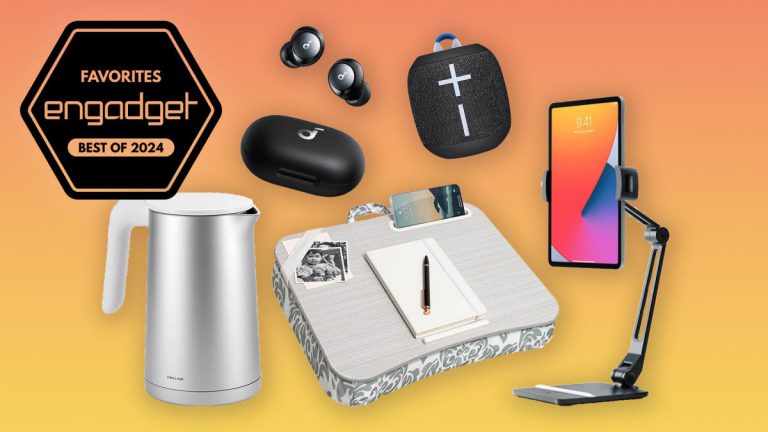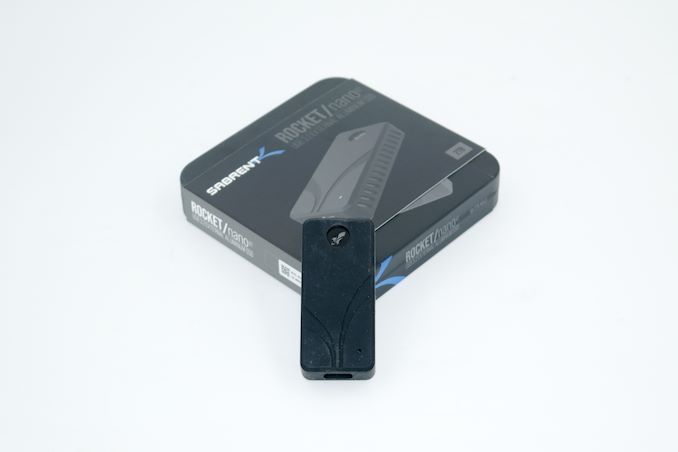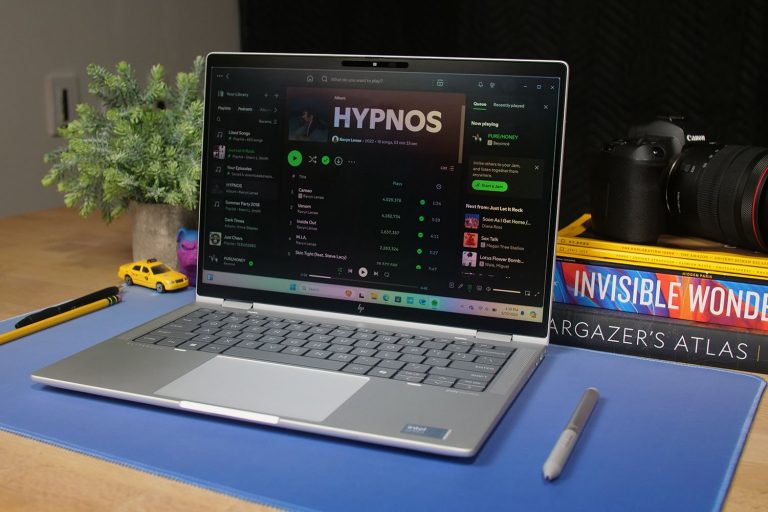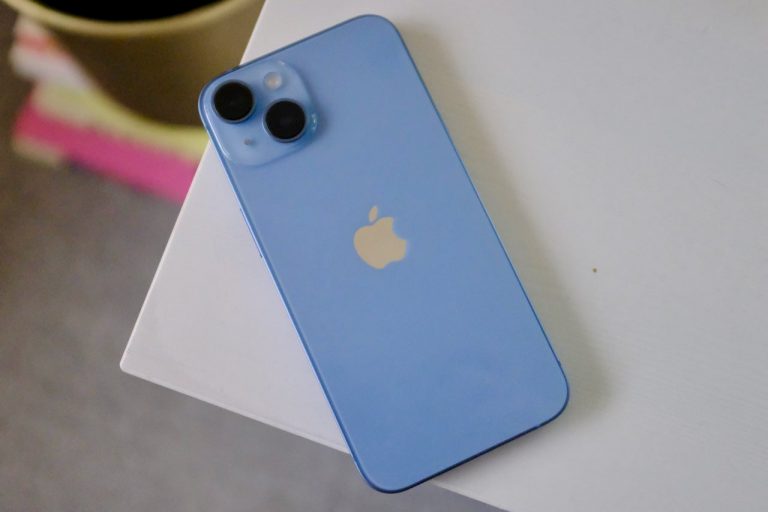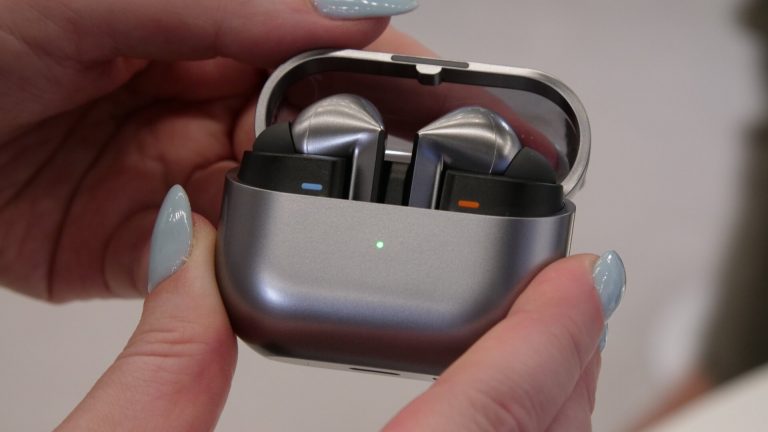Ninja Luxe Café review: an espresso machine anyone can master
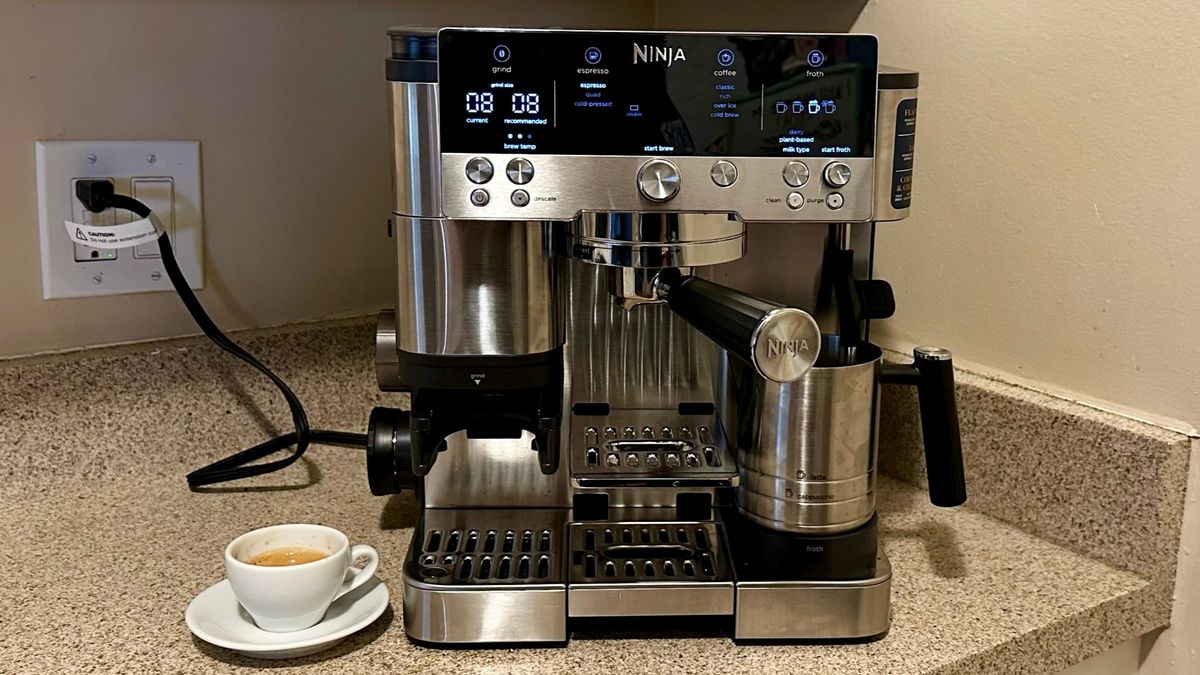
Ninja Luxe Café: two-minute review
The Ninja Luxe Café is a three-in-one bean-to-cup coffee machine that makes espresso, drip coffee, and cold brew. With its grind size suggestions based on the type of drink, a weight-based dosage system, and an automatic milk frother, much of the guesswork when it comes to perfecting your brew is taken out of the equation It’s perfect for novices who are just beginning to dip their toes in the espresso world. But the real question is, does the Ninja Luxe Café actually deliver on its claim? And I’m happy to report that, for the most part, it does.
Ninja has been in the small kitchen gadget game for a while now, with a range of pod and drip coffee machines including the Ninja DualBrew Pro, but the Luxe Café is its first foray into bean-to-cup espresso machines – a field that’s currently dominated by brands like Breville and De’Longhi. In fact, the Luxe Café goes head to head with one of Breville’s most popular semi-automatic espresso machines, the Breville the Barista Express – and in my opinion, it comes out ahead thanks to the lower price tag, foolproof espresso system, and ability to also brew drip coffee.
As soon as I took the Ninja Luxe Café out of its packaging, it looked and felt like a far more expensive machine. Though bulky, its sleek stainless steel body with black accents fit right into my kitchen. Given all that’s happening on this coffee maker, with its wealth of features and massive display, it’s a little intimidating at first but surprisingly easy to master.
The range of tools (like a funnel that does a decent job at keeping grinds in the filter and Luxe basket for quad shots and coffee brews) are nice inclusions, and Ninja has added a space to store these tools and more when not in use. Talk about convenience. However, it’s missing a hot water line for americanos, tea, and other beverages, I wish one could’ve been incorporated in some way.
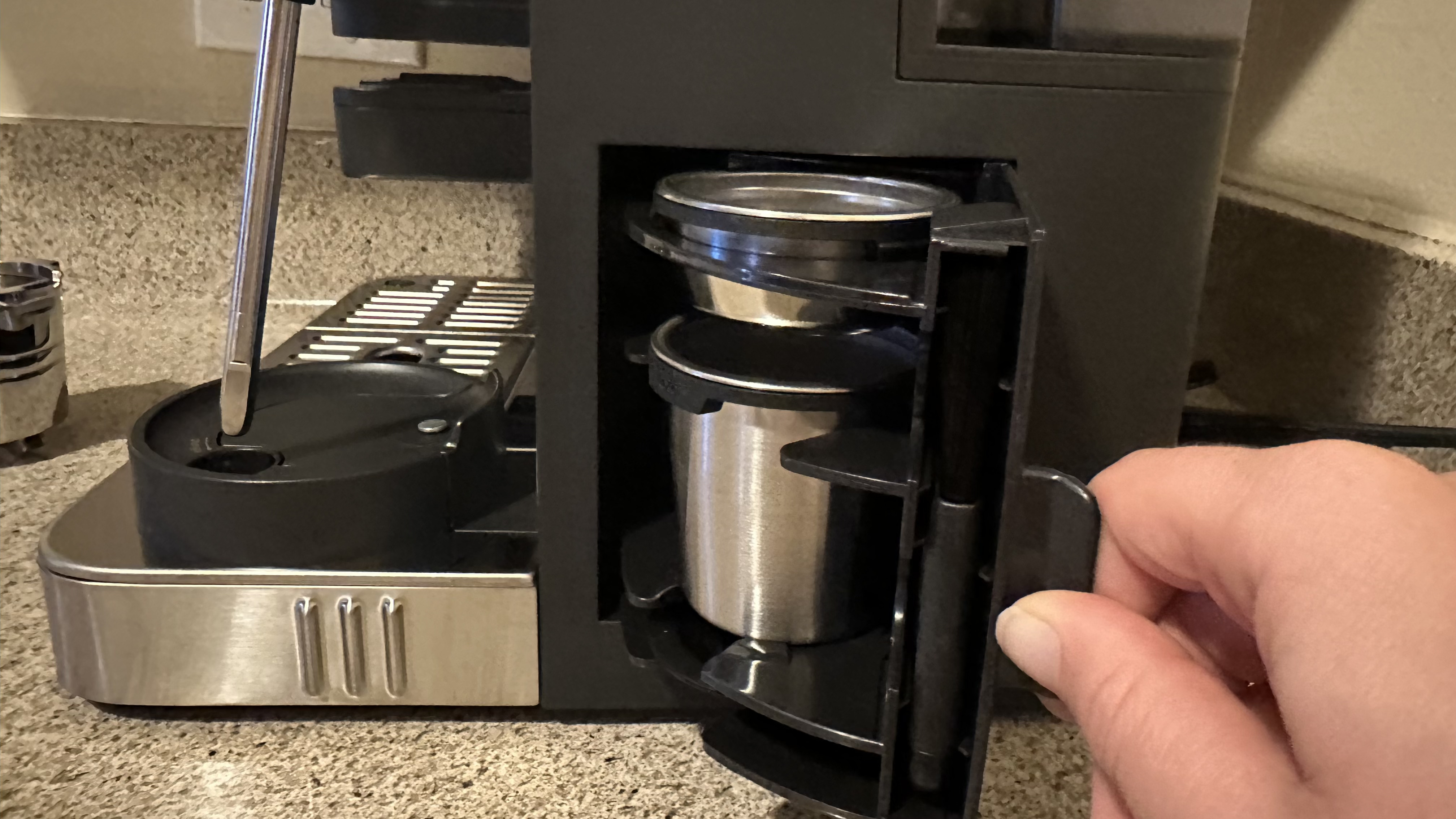
The Ninja Luxe Café looks the part of a quality bean-to-cup machine, and luckily, it performs just as great. The grind size suggestions and weight-based dosage system were a huge boon, ensuring I had the perfect espresso pull every time with a lovely golden crema and strong, smooth taste. On the coffee side, the hot coffee and cold brew turned out great with minimal effort, as I never needed to measure out the proper amount of ground coffee or determine the proper grind size. However, the four different coffee settings were a bit gimmicky and unnecessary. A cold brew and classic coffee would’ve been fine.
When I wanted to make a latte, cappuccino, or flat white, the automatic milk frother settings almost always worked with my 2% milk, creating a lovely microfoam with no skill needed. Unfortunately, the frother didn’t perform as well with oat milk, not a major surprise, as this is the case with many plant-based milks. A cold foam setting is also available but didn’t work with either of my milks. I missed the manual option for steaming milk with a steam wand, as I love extra hot drinks and practicing my steaming technique.
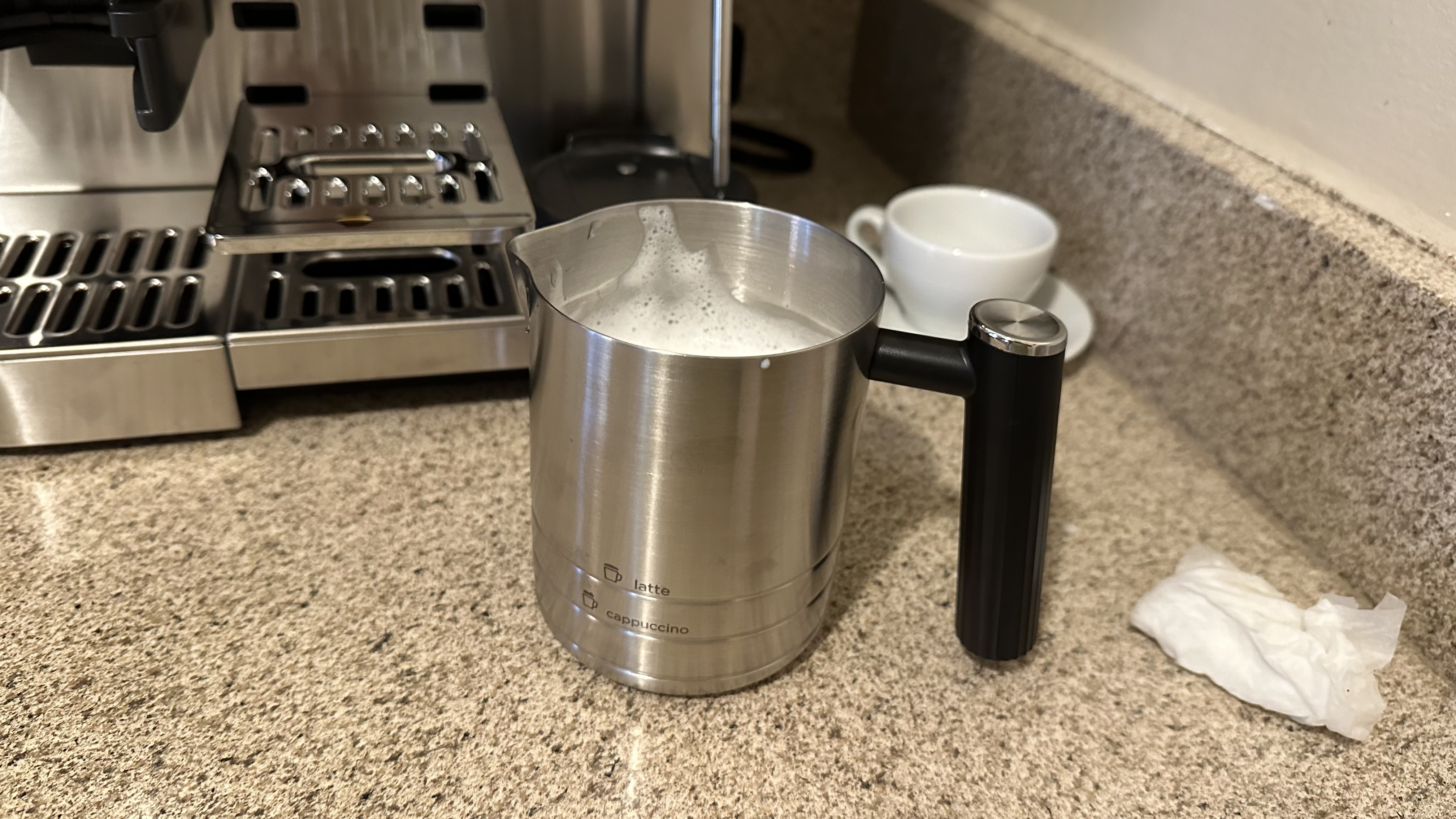
Overall, if you’re a beginner who wants a quality, great value espresso machine that makes it easy to pull the perfect shot, the Ninja Luxe Café is for you. Even experienced at-home baristas will appreciate the excellent results this machine delivers. And it’s hard to beat the bonus of brewing tasty classic coffee and cold brew too.
Ninja Luxe Café review: price and availability
- List price: $499.99 (about £400 / AU$750)
- Launch date: June 2024
- Availability: US
The Ninja Luxe Café’s launch price was $499.99 (about £400 / AU$750), and at the time of writing it is only available in the US. It can be purchased directly from the manufacturer’s website, or from third-party retailers including Best Buy and Amazon. This bean-to-cup machine was only recently released, don’t expect to find any major discounts for at least a few months.
Sitting right at a mid-range price point in the wider market, the Ninja Luxe Café’s versatility, solid performance, ease of use, and stunning build quality punch far above its weight. I would’ve expected this machine to cost far more, and it’s sure to give the ever-popular Breville The Barista Express a run for its money, especially since Breville’s offering costs $200 more and does less.
- Value for money score: 5 out of 5
Ninja Luxe Café review: specs
| Name | Ninja Luxe Café Premier Series ES601 |
| Type | Bean-to-cup |
| Dimensions | 12.99 x 13.39 x 14.57in / 330 x 340 x 370mm (L x W x H) |
| Weight | 25.73lb / 11.67kg |
| Water reservoir capacity | 70oz / 2.07L |
| Milk frother | Yes |
| Number of drink sizes | 9 |
| Bars of pressure | 9 |
| Noise level | 60dB |
| Cord length | 43in / 1.09m |
Ninja Luxe Café review: design
- Stunning, sturdy build
- Massive display
- Helpful storage features
- Lacks hot water line
Besides one glaring omission, I have almost no notes on the design of the Ninja Luxe Café. Like any bean-to-cup machine, it’s definitely not compact and takes up a good chunk of counter space and just fits under my kitchen cabinets, measuring 12.99 x 13.39 x 14.57in / 330 x 340 x 370mm (L x W x H). That’s just a little bit bigger than the most recent semi-automatic espresso machine I’ve been using, the Casabrews 5700Pro. At least Ninja’s offering is extremely versatile, making the most of that extra space it takes up. Weighing 25.73lb / 11.67kg, it’s also quite heavy, so I tried to move it around as little as possible.
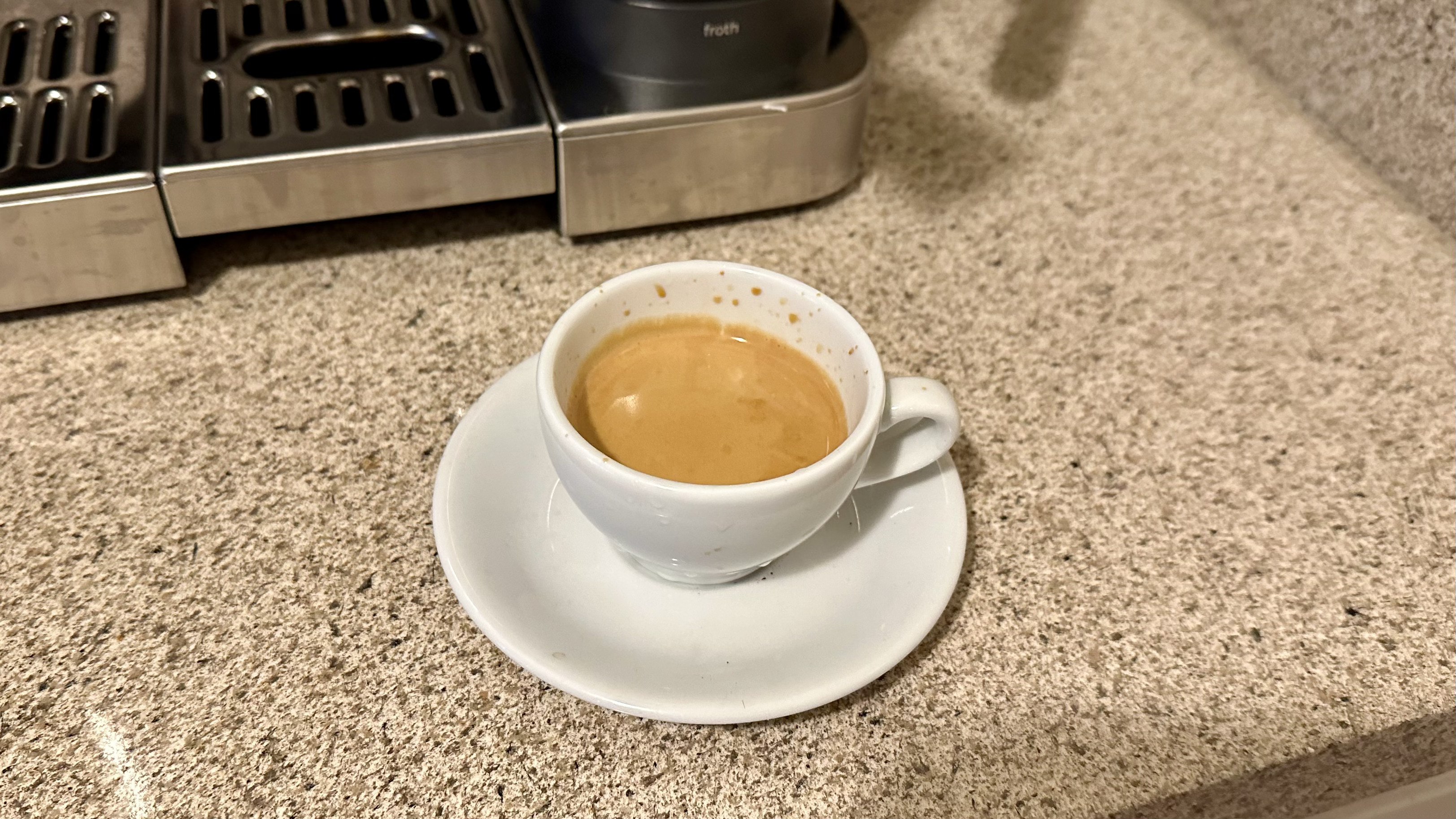
As soon as I removed the Ninja Luxe Café from the box, I was struck by its sleekness, offering a stainless steel finish with black accents. Even the packaging for the tools oozed elegance. It was far nicer than I expected considering the reasonable price tag. It truly looks and feels like something that should be twice that price. Each component was sturdy and built to last.
Setting up this bean-to-cup machine was on par with others I tested, taking me just over 20 minutes to have my first shot of espresso ready to go. However, the Luxe Café is unique, as it calibrates itself, so you don’t need to experiment with different grind sizes for a great espresso pull. The hardness of your water is even taken into account, helping to perfect the extraction. If you’ve never used an at home espresso machine before, it’s a little overwhelming initially. A few instructional videos and an instruction book were helpful in navigating the Luxe Café.
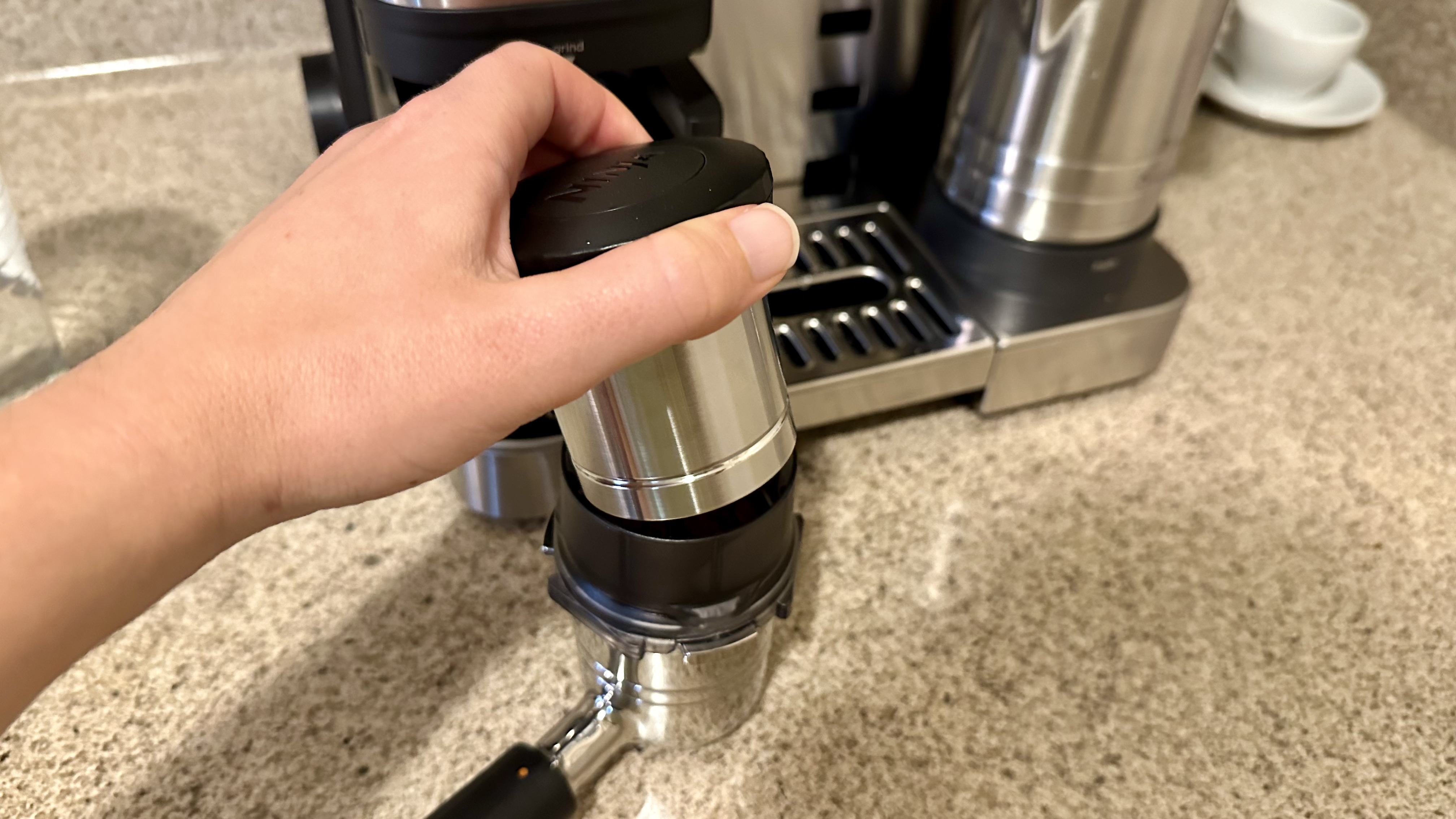
After it was put together, I played around with the design features. Ninja thought of almost everything. The accessory storage was probably my favorite, as it’s a rarity on espresso machines. It drives me crazy to have components lying around waiting to be lost. A handy little door on the side of the machine opens up, letting you store a few cleaning tools, along with the double and Luxe baskets for the portafilter. The opposite side of the machine houses the tamper and funnel – which helps prevent grinds from getting everywhere while grinding – for ultra-easy access.
On top of the machine sits the removable bean hopper/grinder with a UV-protective lid to keep the beans fresher longer with an easy-to-use dial for adjusting grind size on the side, while around the back is a removable 70oz water reservoir. The water reservoir doesn’t appear to have any major filter, or the option to add one – a slight disappointment – and isn’t the easiest to reach given the location at the back of the machine under my cabinets. That’s not dissimilar to other coffee makers. Still, it holds a good amount of water. I refilled it only a couple of times per week after making about three beverages a day.
All the action happens at the front of the machine, and its most striking feature is the massive display running almost its entire width. The display lacks touch control, but a wealth of buttons and a couple of knobs made navigating relatively simple after familiarizing myself with the system.
Above the grinder, the display informs you of the current and recommended grind sizes based on the type of brew. Red warnings will even light up if the funnel, hopper, or portafiler aren’t installed or the coffee beans are out. It’s honestly pretty foolproof.
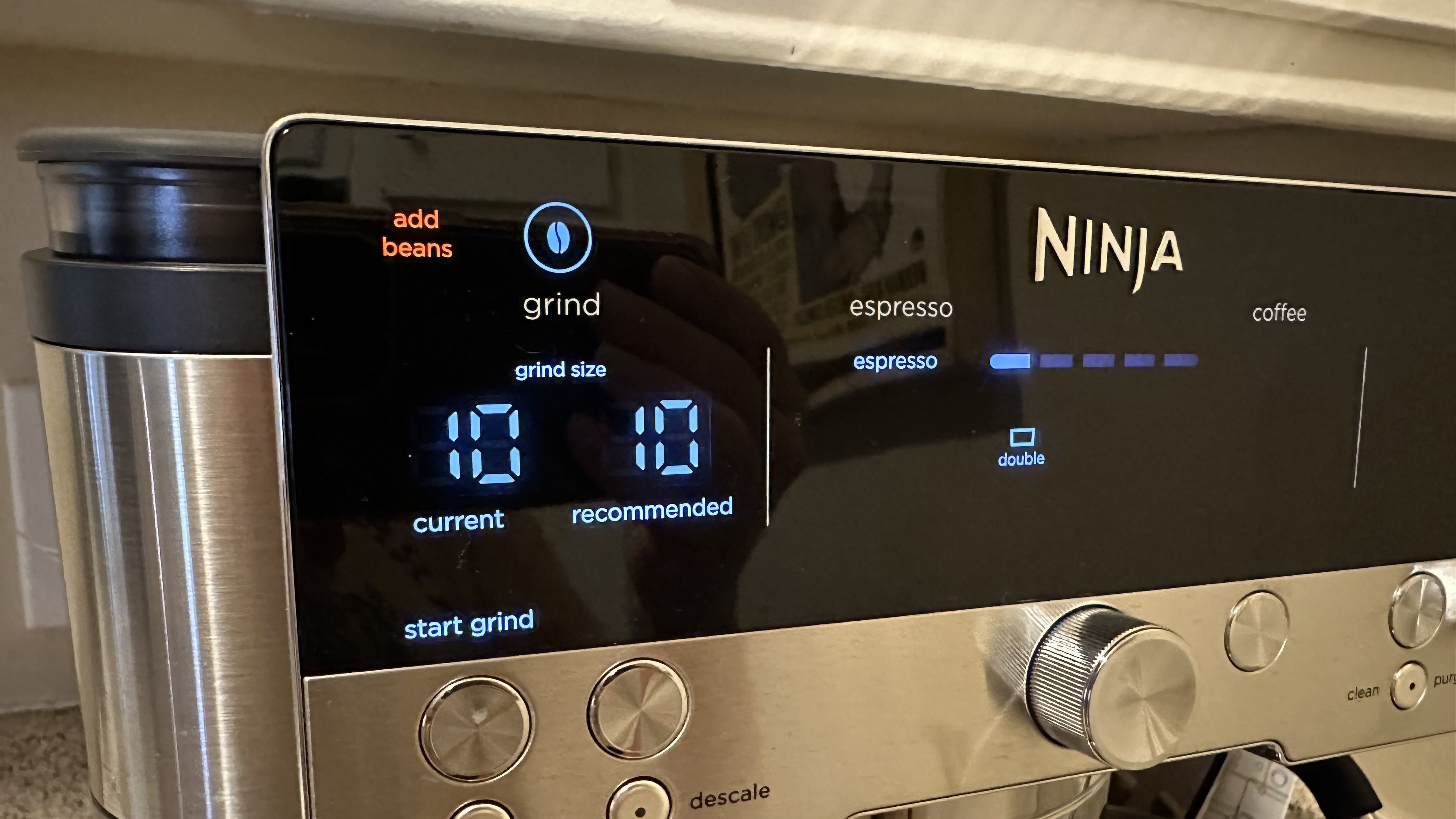
The center of the display right above the group head, which securely holds the portafilter during brewing, is where the type of brew is selected. On the espresso side, double, quad, and cold-press options are available, and the coffee side features a classic, rich, over-ice, and cold brew setting, along with various size options. Also at the center is the progress bar – a handy little tool that informs how far along in grinding, brewing, or milk frothing you are. Similar to the red warnings on the grinding side of the display, a rinse notification will display when the group head needs a quick clean.
Finally, above the frother are the milk frothing settings. Unlike many semi-automatic brewers, this one lets you select foam levels and milk type: dairy or plant-based. I only had to add the milk to the jug with an integrated whisk and place it in its designated location with the steam wand inserted. The jug even has size markings inside and outside, so you get the proper milk levels. The steam wand automatically purges after frothing, though a ‘purge’ button is available. This side of the display also indicates when the water reservoir needs to be filled.
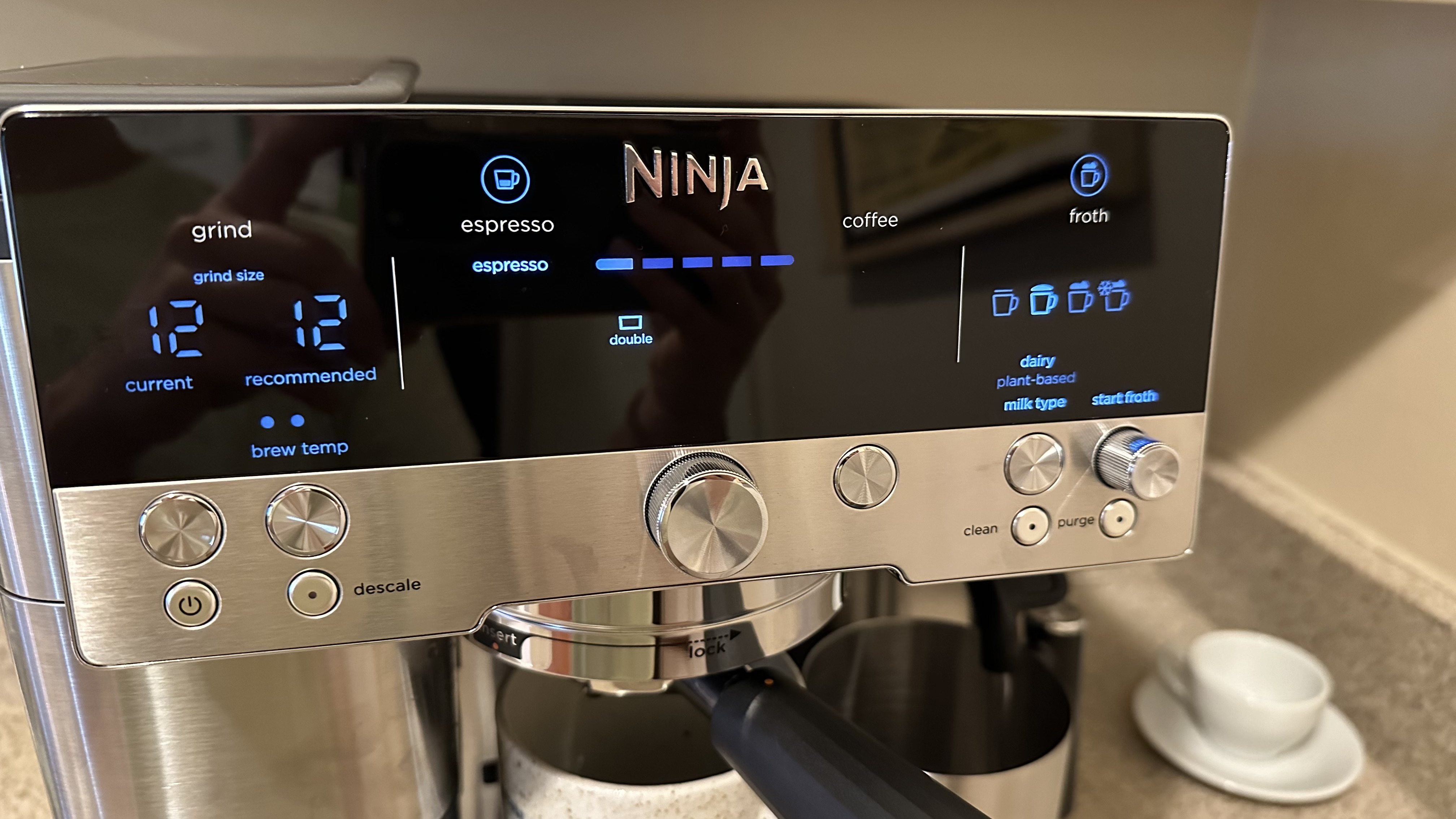
At the base of the Ninja Luxe Café is the main drip tray and a separate center drip tray. It felt unnecessarily complicated being two components. However, having a separate center drip tray makes it possible to use larger travel mugs. On the side of the main drip tray is a tiny indicator, letting you know when it’s full and needs emptying. I had to empty it every few days of use. Beyond the removable center drip tray, another sturdy adjustable cup tray can be set at different levels, depending on the vessel – a handy addition that prevents splashing.
It truly seems that Ninja thought of everything when crafting the Luxe Café, except for a water line. I love having a hot water option to make an americano, tea, or other warm beverage. Integrating one into the steam wand or elsewhere would’ve brought the machine near perfection level in terms of design. Instead, I relied on a kettle, something I never had to do with my usual espresso machine.
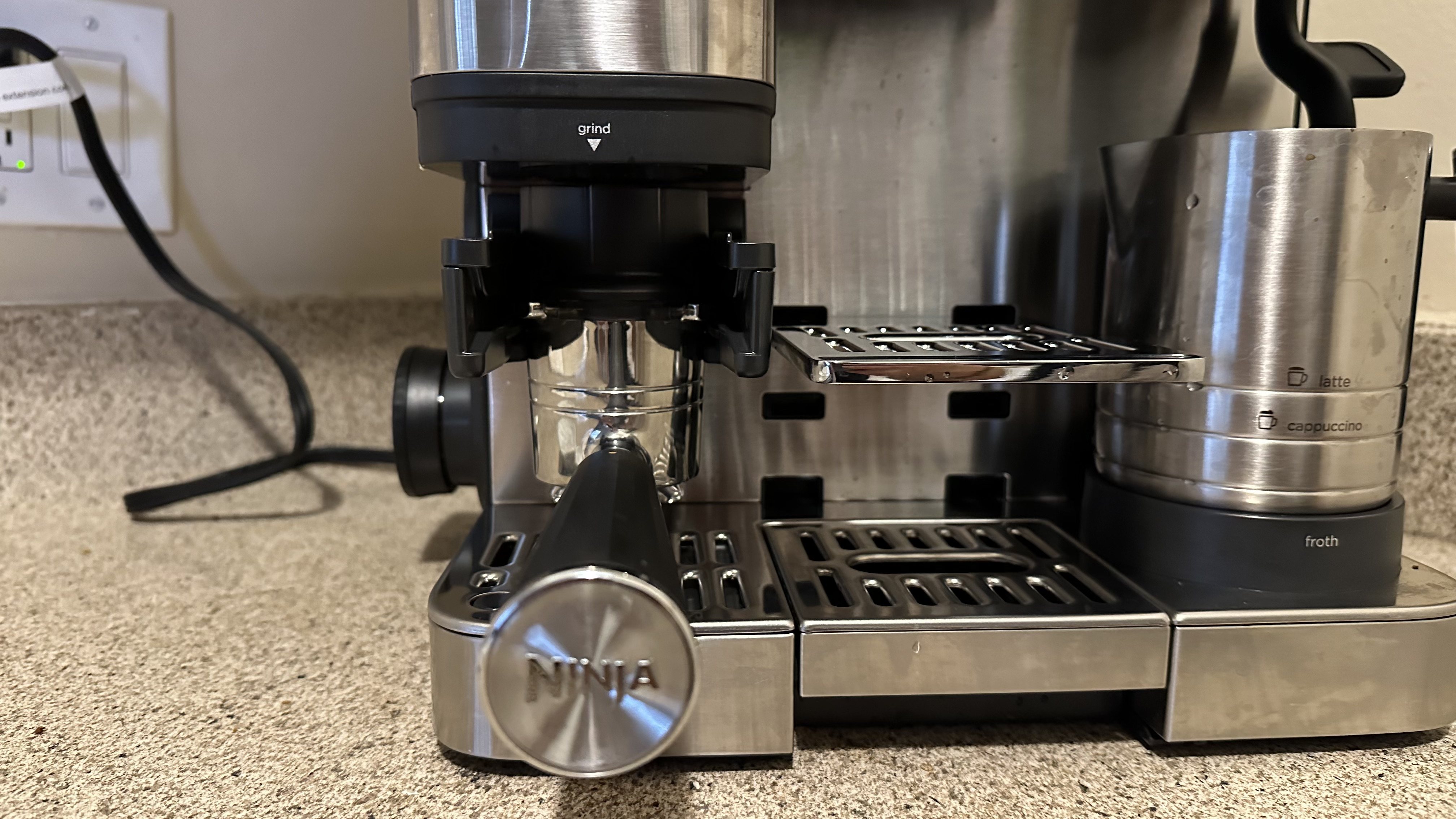
As for the accessories, the portafilter also doubles as a brewer for the coffee settings on the machine. It comes with two baskets: double and Luxe. When using the coffee settings or brewing a quad shot, the Luxe basket must be installed. Like most portafilters, it’s a bit of a struggle to swap baskets, but that ensures they remain securely in place when dumping grinds. Unfortunately, it costs extra for the knock box to remove the grinds. Luckily, the grinds come out relatively easy with just a few whacks against the garbage can.
Beyond the portafilter, many of the other accessories deal with maintenance. A descaling powder, a cleaning disc, a cleaning brush, and a couple of cleaning tablets ensure the machine remains in tip-top shape.
- Design score: 4.5 out of 5
Ninja Luxe Café review: performance
- Handy grind size suggestions and automatic weight-based dosage
- Consistently great espresso pulls and coffee brews
- Quick and easy to use
The Ninja Luxe Café is far easier to master than other semi-automatic espresso machines; even novices should figure it out quickly. That’s, in large part, thanks to the machine’s ability to automatically suggest grind sizes based on the type of drink brewed, the weight-based dosage system for the perfect amount of grinds depending on the drink, and the hands-free frother to dial in the ideal amount of microfoam.
Admittedly, the whole system is a little overwhelming initially, especially the large display and various controls. But, after a couple of brews, I had it down to a science and had to do far less experimenting with grind size than usual to pull the perfect espresso shot, wasting less pricey coffee beans and time. Regular coffee always requires less effort for a solid brew, and this machine delivered a great classic cup of joe on the first try.
Seven different types of brews are available with Ninja Luxe Café. On the espresso side is a double, quad, and cold-pressed extraction, while coffee can be brewed classic, rich, over-ice, and cold brew. I tested out every setting to see how each stacked up.

I started with the double espresso shot, my most used setting over the testing period. Installing the double basket on the portafilter required a little muscle while the funnel easily latches on top. Inserting the portafilter into the grinder will automatically adjust the brew setting options based on the installed basket. With the double basket, only a double or cold-pressed extraction was available. Turning the large main knob lets you select the setting. If the funnel isn’t on when the portafilter is inserted into the grinder, a warning will pop up – I forgot to use it many times.
The machine then tells you the ideal grind size for the espresso pull, and you can adjust to the suggested grind size using a knob on the side of the machine. I adjusted accordingly and started the grind. The progress bar at the center of the display let me know how far along in the process I was.
After grinding, it was time to brew. I used the tamper with the funnel still attached to level the freshly ground coffee. It did a successful job of keeping the grinds in the basket most of the time, but on several occasions, a good deal of grinds managed to escape. This usually happened when the basket was extremely full, or I inserted the tamper too fast.
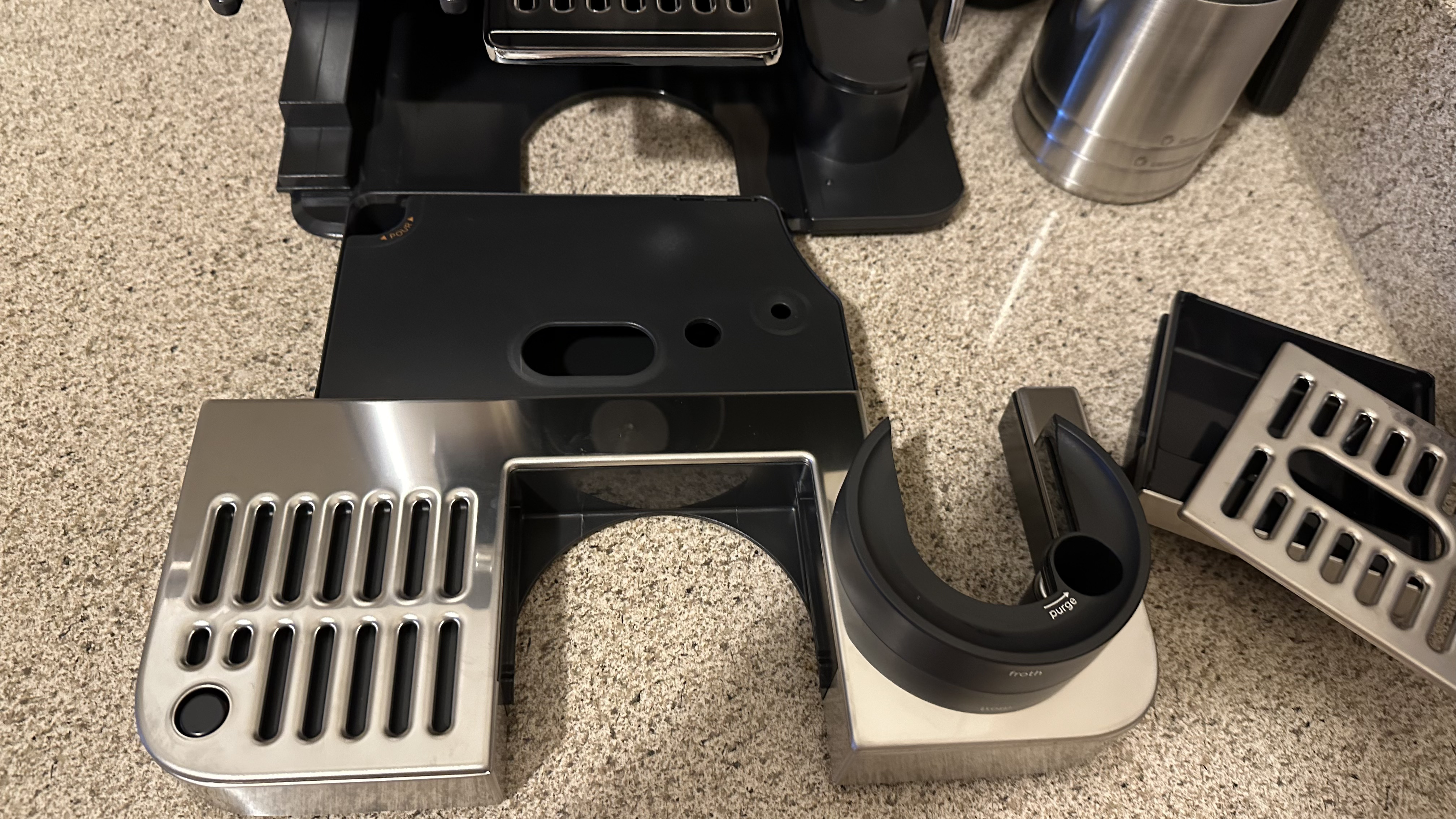
Placing the portafilter securely into the group head takes some effort, and I usually had to hold the body of the coffee maker to prevent the whole setup from moving. From there, I moved the handy little adjustable cup tray to fit my mug and pressed the large center knob to begin the brew, watching the progress bar begin to flash. Less than a minute later, a beep indicated that my double-shot espresso was ready. The whole process is quiet too, averaging about 60dB, so you don’t need to worry about waking others in the household for an early morning caffeine fix.
The espresso shot had a thick golden crema that could briefly hold a small sprinkling of granulated sugar before falling through. The crema then reformed after; a tell-tale sign of great pull. Its taste was equally wonderful, rich, and smooth with a slight acidity.
Without fail, each espresso pull after my initial yielded similar results, including the quad shot and cold-pressed extraction. However, the cold-pressed extraction only reached about 80°F compared to the 120°F for the other two espresso shot settings. It also took slightly longer to brew at 2.5 minutes but was perfect for my iced lattes and prevented ice melt. Of course, results will also vary based on the type of coffee beans used. I stuck with quality beans from Stumptown and Groundwork during my testing.
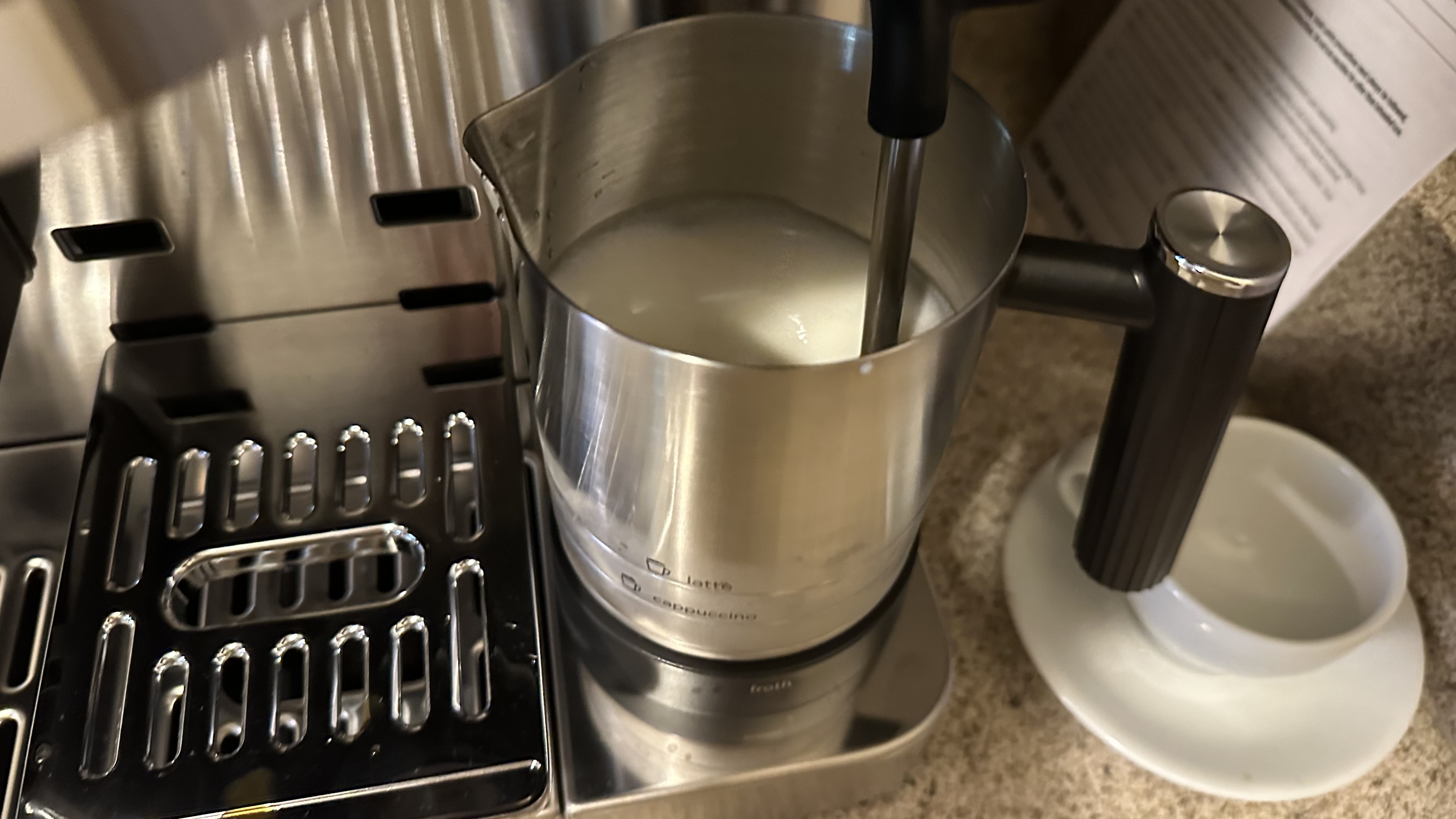
Brewing coffee follows a similar process, although the larger Luxe basket will always be installed and there’s no need to use the tamper. The grind sizes for all the coffee brews were significantly larger than the espresso, and there are various brew size options from six oz to 18 oz. The Ninja Luxe Café automatically adjusts the amount of beans it grinds based on the brew size and weight. It’s honestly hard to beat the convenience of not needing to measure out anything ever.
The coffee brews took longer than the espresso pulls, at around three to six minutes, depending on the setting and size. The results were consistently flavorful with just a slight bitterness, never watered down which was one of my fears. However, if you asked me to differentiate between the ‘rich’ and ‘classic’ settings, I wouldn’t be able to. Each tasted great and had a temperature of around 160°F. The same goes for the ‘over-ice’ and ‘cold brew’. Both settings brewed the coffee at a lower temperature around 100°F, but I couldn’t tell you the difference between the two. The Ninja DualBrew Pro I reviewed in 2023 had similar setting options and results. It all just seems sort of gimmicky on an otherwise awesome machine.
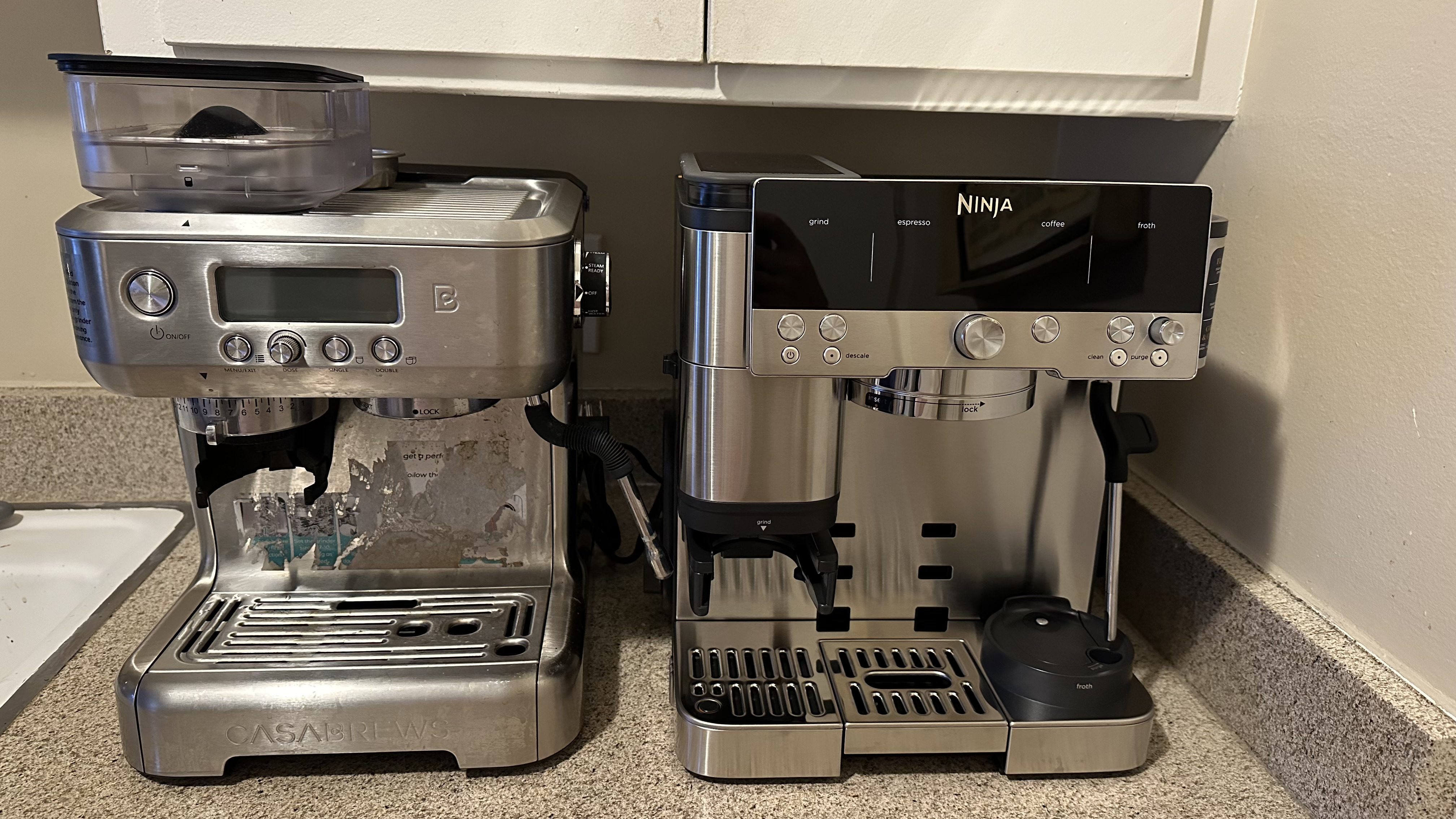
Beyond brewing espresso and coffee, the Ninja Luxe Café offers a hands-free milk frother for those coffeehouse-style drinks at home. It’s sometimes a struggle to get the perfect microfoam from a steam wand, and this takes all the guesswork away. The milk jug has an integrated whisk, and when combined with a steam wand on the machine, frothing was easier than ever. I could even choose between four presets: steamed milk, thin froth, thick froth, and cold foam.
I tested all the froth presets with both 2% milk and oat milk. With 2% milk, the frothing settings worked just as expected (for the most part). The steamed milk yielded little foam just warming the milk, the thin froth had a nice bit of microfoam ideal for latte art and flat whites, while the thick froth had a nice fluffy foam on top that lasted the entire time I drank my cappuccino. Unfortunately, the oat milk struggled to form much of a microfoam, even on the thick froth setting. But these results aren’t uncommon for plant-based milks, so I don’t fully fault the machine. I also failed to create a cold foam, as heavy cream is required for that setting.
My biggest issue with the milk frother is you can’t control the steam wand yourself. I’m a big fan of extra hot beverages during the colder months, and with the Ninja Luxe Café, it isn’t possible to heat the milk a little longer for extra warmth or even test the waters of frothing milk with a steam wand unassisted. Sure, it’s nice to have everything pretty automatic, but sometimes, especially for the more experienced, the option for a little more freedom would’ve been a welcome addition.
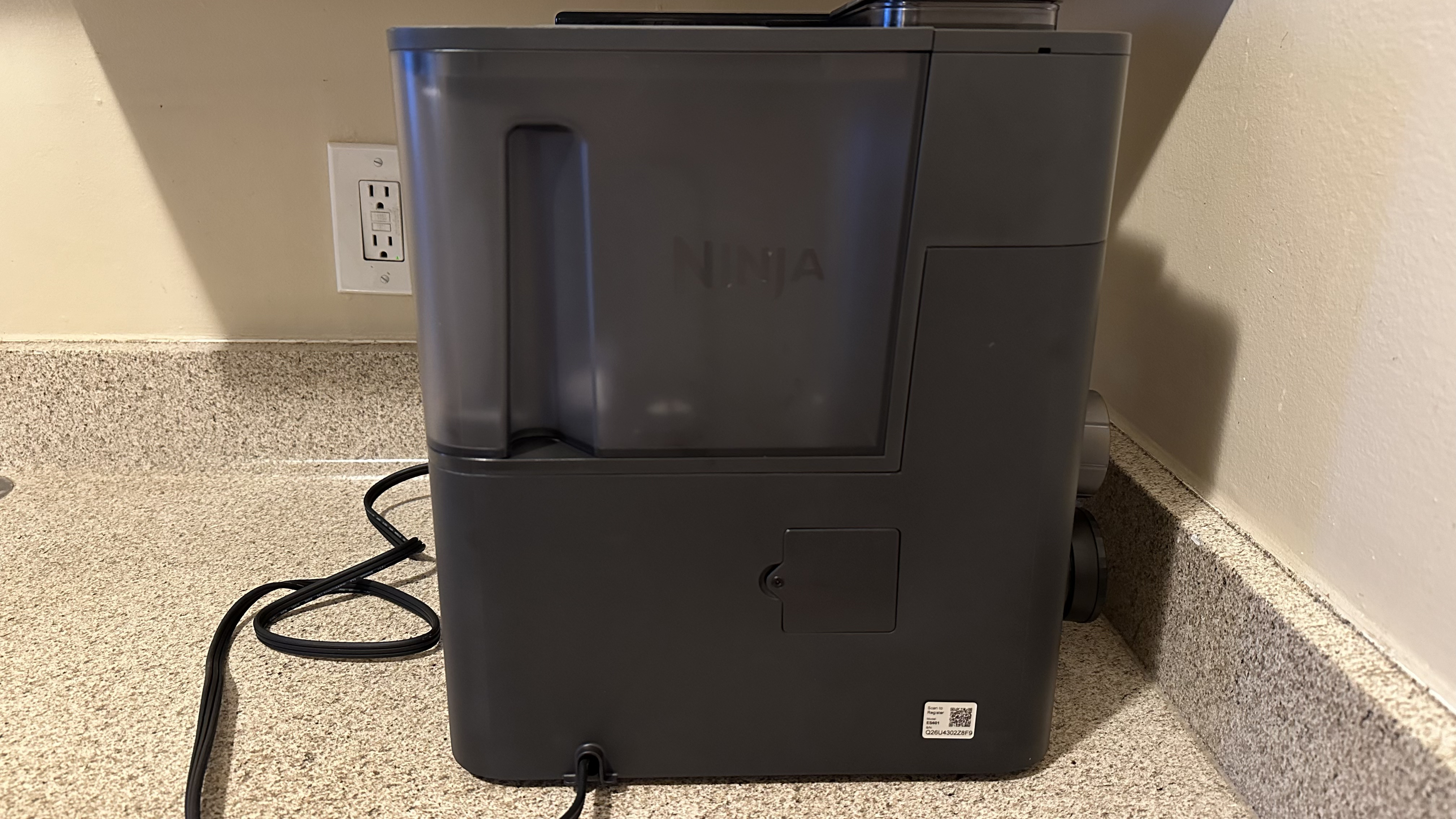
When it comes to maintenance, the Luxe Café attempts to keep things as simple as possible. Besides rinsing the portafilter, emptying the drip tray, and wiping down the machine, there isn’t much hands-on cleaning that needs to be done. Even after several weeks of use, the machine looked is good as new besides a few splashes of coffee on the front panel and grinds in the drip tray.
Occasionally, the coffee maker’s internals will need a thorough cleaning, but the most you will have to do is either fill the water reservoir with a descaling solution or insert the cleaning disc and tablet into the portafilter, and press a few buttons after. It’s all very manageable.
Overall, the Ninja Luxe Café delivered on its promises of uncomplicating espresso. It consistently created quality espresso and made things simpler by intuitively dosing and providing the correct grind level for the perfect pull, something you’d be hard-pressed to find on other semi-automatic espresso machines at this price point. The milk frother made it possible to create some near-coffeehouse-level lattes, cappuccinos, and flat whites at home, which in the long run could end up saving you a ton of money. Plus, it’s a nice bonus to get delicious regular and iced coffee brews from the same machine — a feature you don’t see in most mid-range bean-to-cup offerings.
- Performance score: 4 out of 5
Should you buy the Ninja Luxe Café?
| Attribute | Notes | Score |
|---|---|---|
| Value for money | A mid range price for a bean-to-cup machine, but the versatility, quality build, and ease of use punch far above its weight, justifying the cost. | 5/5 |
| Design | The Luxe Café is a bulky, well-built machine that looks stunning and offers handy storage features and a wealth of quality accessories. However, it lacks a separate hot water line. | 4.5/5 |
| Performance | Easy to master machine with consistently delicious drinks thanks to the foolproof grind size suggestions, weight-based dosage system, and automatic frother. | 4/5 |
Buy it if
Don’t buy it if
Ninja Luxe Café: also consider
| Header Cell – Column 0 | Ninja Luxe Café | Casabrews 5700Pro | Breville the Barista Express |
|---|---|---|---|
| Price | $499.99 (about £400 / AU$750) | $899.99 (about £700 / AU$1,300) | $699.95 / £629.95 / AU$999 |
| Type | Bean-to-cup | Bean-to-cup | Bean-to-cup |
| Milk frother | Yes | Yes | Yes |
| Bars of pressure | 9 | 20 | 15 |
If you’re not sure about the Ninja Luxe Café, here are a couple of other options to think about
How I tested the Ninja Luxe Café
I used the Ninja Luxe Café for several weeks at home, making two to three coffee drinks per day using high quality Stumtown and Groundwork coffee beans. During testing, I noted flavors, consistency, temperature, time to brew, and noise levels. Beyond drinking the espresso and coffee black, I tried the different milk frother presets with both dairy and plant-based milk, observing the foam levels and differences between settings. In the end, I tested almost every setting on the bean-to-cup machine and observed how it held up to usage.
Source: www.techradar.com

